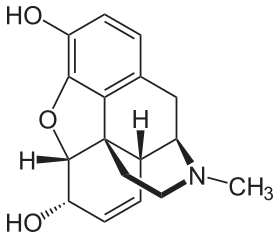オピオイド使用障害
この記事は英語版の対応するページを翻訳することにより充実させることができます。(2024年6月) 翻訳前に重要な指示を読むには右にある[表示]をクリックしてください。
|
オピオイド使用障害(オピオイドしようしょうがい、英: Opioid use disorder、OUD)は、オピオイドの使用パターンにより重度の障害または苦痛を引き起こす状態のことである[3]。オピオイド依存(症)(英: Opioid dependence)とも呼ばれる[13]。症状には、オピオイドを使用したいという強い欲求、オピオイドに対する耐性の増加、義務の履行の困難、使用を減らすことに苦戦する、使用中止に伴う離脱症候群などがあげられる[4][5]。オピオイド離脱症状には、吐き気、筋肉痛、下痢、睡眠障害、興奮、気分の落ち込みなどがあげられる[5]。嗜癖と依存は、物質使用障害の構成要素である[14]。合併症には、オピオイドの過剰摂取、自殺、 HIV / AIDS 、 C型肝炎、結婚問題、失業などがあげられる[4][5]。
| オピオイド使用障害 | |
|---|---|
| 別称 | Opioid addiction,[1] problematic opioid use,[1] opioid abuse,[2] opioid dependence[3] |
 | |
| Molecular structure of morphine | |
| 概要 | |
| 診療科 | 嗜癖学, 精神医学 |
| 症状 | Strong desire to use opioids, increased tolerance to opioids, failure to meet obligations, trouble with reducing use, withdrawal syndrome with discontinuation[4][5] |
| 継続期間 | 長期[6] |
| 原因 | オピオイド[3] |
| 診断法 | DSM-5診断基準による[4] |
| 鑑別 | アルコール依存症 |
| 合併症 | Opioid overdose, hepatitis C, marriage problems, unemployment, poverty[4][5] |
| 使用する医薬品 | Buprenorphine, methadone, naltrexone[7][8] |
| 治療 | オピオイド置換療法、行動療法、12ステップのプログラム、ナロキソン[7][9][10] |
| 頻度 | 27 million (c. 0.4%)[4][11] |
| 死亡数・率 | 122,000 (2015)[12] |
| 分類および外部参照情報 | |
オピオイドには、ヘロイン、モルヒネ、フェンタニル、コデイン、オキシコドン、ヒドロコドンなどの物質が含まれる[5][6]。米国では、ヘロイン使用者の大多数は処方オピオイドを使用することから始まり、それらは違法的に購入される場合もある[15][16]。誤用の危険因子には、薬物使用の履歴、家族や友人の間での薬物使用、精神疾患、低い社会経済的地位、人種などがあげられる[17][18]。診断には、アメリカ精神医学会のDSM-5の基準に基づいておこなわれる[4]。1年間に11の基準のうち2つ以上の基準にあてはまる場合、オピオイド使用障害と診断される[4]。病気の治療のためにオピオイドを服用している場合の耐性や離脱の症状には適用されない[4]。
オピオイド使用障害のある人は、メタドンまたはブプレノルフィンを用いたオピオイド代替療法で治療されることがよくある[7]。オピオイド代替療法を受けている場合、死亡のリスクは減少する[7]。さらに、認知行動療法、メンタルヘルス専門家による個人または集団療法などの他の形態のサポート、12ステッププログラム、この他のピアサポートプログラムも有用な場合がある[9]。投薬のナルトレキソンも再発を防ぐのにも役立つ可能性がある[8]。ナロキソンはオピオイドの過剰摂取を治療するのに有用であり、リスクのある人にナロキソンを家に持ち帰らせることは有益である[10]。
2013年には、オピオイド使用障害は約0.4%の人に影響を及ぼした[4]。 2016年には、約2,700万人が影響を受けた[11]。長期のオピオイド使用は、外傷または手術関連の痛みの緩和のために使用した後、約4%の人に発生する[19]。発症は若年成人期に多い[4]。男性は女性よりも頻繁に影響を受ける[4]。オピオイド使用障害による2015年の世界の死亡者数は122,000人であり[12]、1990年の18,000人の死亡者数から増加している[20]。 2016年の米国では、オピオイドの過剰摂取により42,000人以上が死亡しており、そのうちの15,000人以上はヘロインの使用による[21]。
出典
編集- ^ a b "FDA approves first buprenorphine implant for treatment of opioid dependence". U.S. Food and Drug Administration (FDA) (Press release). 26 May 2016. 2017年3月16日閲覧。
- ^ “3 Patient Assessment”. Clinical Guidelines for the Use of Buprenorphine in the Treatment of Opioid Addiction.. Rockville (MD): Substance Abuse and Mental Health Services Administration (US). (2004)
- ^ a b c “Commonly Used Terms”. www.cdc.gov (29 August 2017). 16 July 2018閲覧。
- ^ a b c d e f g h i j k l American Psychiatric Association (2013), Diagnostic and Statistical Manual of Mental Disorders (5th ed.), Arlington: American Psychiatric Publishing, pp. 540–546, ISBN 978-0890425558
- ^ a b c d e f Substance Use and Mental Health Services Administration (2014年9月30日). “Substance Use Disorders”. 3 May 2018閲覧。
- ^ a b “Opioid Use and Opioid Use Disorder in Pregnancy”. ACOG (August 2017). 16 July 2018閲覧。
- ^ a b c d “Mortality risk during and after opioid substitution treatment: systematic review and meta-analysis of cohort studies”. BMJ 357: j1550. (April 2017). doi:10.1136/bmj.j1550. PMC 5421454. PMID 28446428.
- ^ a b “Opioid Use Disorders”. Child and Adolescent Psychiatric Clinics of North America 25 (3): 473–87. (July 2016). doi:10.1016/j.chc.2016.03.002. PMC 4920977. PMID 27338968.
- ^ a b “Treatment for Substance Use Disorders”. Substance Abuse and Mental Health Services Administration (October 2014). 16 July 2018閲覧。
- ^ a b “Are take-home naloxone programmes effective? Systematic review utilizing application of the Bradford Hill criteria”. Addiction 111 (7): 1177–87. (July 2016). doi:10.1111/add.13326. PMC 5071734. PMID 27028542.
- ^ a b “WHO | Information sheet on opioid overdose”. WHO. 2019年4月6日閲覧。
- ^ a b GBD 2015 Mortality Causes of Death Collaborators (October 2016). “Global, regional, and national life expectancy, all-cause mortality, and cause-specific mortality for 249 causes of death, 1980-2015: a systematic analysis for the Global Burden of Disease Study 2015”. Lancet 388 (10053): 1459–1544. doi:10.1016/S0140-6736(16)31012-1. PMC 5388903. PMID 27733281.
- ^ Steele, Anne. “オピオイド依存の診断、過去7年で500%増加=米調査”. WSJ Japan. 2023年5月15日閲覧。
- ^ “Neurobiologic Advances from the Brain Disease Model of Addiction”. The New England Journal of Medicine 374 (4): 363–71. (January 2016). doi:10.1056/NEJMra1511480. PMC 6135257. PMID 26816013.
- ^ “Prescription opioid use is a risk factor for heroin use”. National Institute on Drug Abuse. 16 July 2018閲覧。
- ^ Hughes, Evan (2 May 2018). “The Pain Hustlers”. New York Times 3 May 2018閲覧。
- ^ Santoro, T. N.; Santoro, J. D. (2018). “Racial Bias in the US Opioid Epidemic: A Review of the History of Systemic Bias and Implications for Care”. Cureus 10 (12): e3733. doi:10.7759/cureus.3733. PMC 6384031. PMID 30800543.
- ^ Webster, LR (November 2017). “Risk Factors for Opioid-Use Disorder and Overdose.”. Anesthesia and Analgesia 125 (5): 1741–1748. doi:10.1213/ANE.0000000000002496. PMID 29049118.
- ^ “Risk Factors and Pooled Rate of Prolonged Opioid Use Following Trauma or Surgery: A Systematic Review and Meta-(Regression) Analysis”. The Journal of Bone and Joint Surgery. American Volume 100 (15): 1332–1340. (August 2018). doi:10.2106/JBJS.17.01239. PMID 30063596.
- ^ GBD 2013 Mortality Causes of Death Collaborators (January 2015). “Global, regional, and national age-sex specific all-cause and cause-specific mortality for 240 causes of death, 1990-2013: a systematic analysis for the Global Burden of Disease Study 2013”. Lancet 385 (9963): 117–71. doi:10.1016/S0140-6736(14)61682-2. PMC 4340604. PMID 25530442.
- ^ “Data Brief 294. Drug Overdose Deaths in the United States, 1999–2016”. CDC. 18 May 2018閲覧。